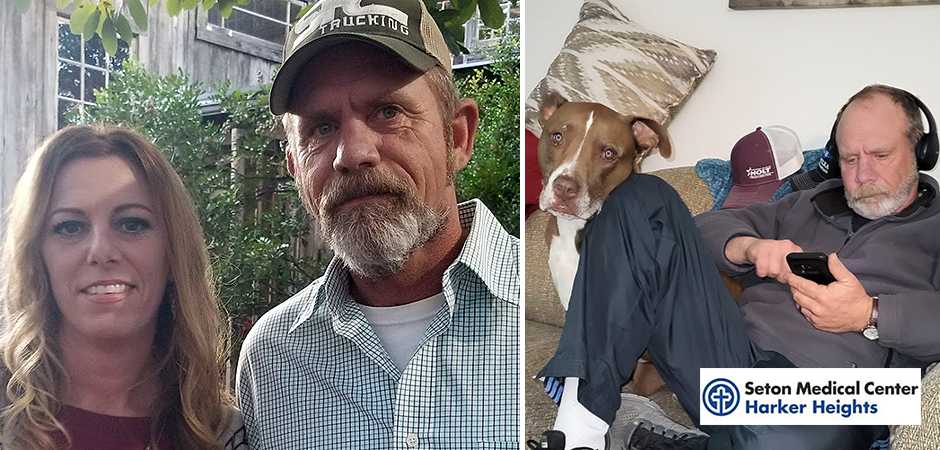Quick care, cardiac stent puts patient on road to better health
It was 7:30 in the evening and for Scott Roberts, age 50, it was time to go to bed.
Scott owns a local trucking company in Kemper, where he lives with his wife Amber. His work day usually starts between 3-4 am, so this was his normal bedtime. Amber, 43, a veterinary surgical technician, could afford to go to bed later.
A few hours later, Scott woke suddenly when he realized the bed was soaking wet. “Scott was sweating a lot and told me his neck hurt,” Amber recalled. “He said he thought there was something wrong, so that’s when we decided to jump in the car and drive to Seton Medical Center Harker Heights.”
Scott was experiencing diaphoresis, which is excessive sweating due to a secondary medical condition.
“Everything was a blur”
After the 35-minute drive to the hospital, Amber and Scott went straight to the emergency department.
 “When we walked in, they started asking Scott some basic questions, but I could see that he was not doing well and was slumping over,” Amber explained. “I had to interrupt her. ‘We think he’s having a heart attack,’ so everyone jumped into action immediately. They were on it!”
“When we walked in, they started asking Scott some basic questions, but I could see that he was not doing well and was slumping over,” Amber explained. “I had to interrupt her. ‘We think he’s having a heart attack,’ so everyone jumped into action immediately. They were on it!”
Staff members arrived and took Scott and Amber back to a treatment room. “Within 5 minutes,” Amber said, “they had IV lines in both of his arms, blood samples drawn, a chest X-ray completed and an EKG set up. Every time they poked him, they got access to his veins with the first stick. With everything they did so quickly, everything was a blur!”
One of the physicians came in and confirmed that Scott was experiencing a heart attack.
“When they said Scott had to go to the catheter lab right now, I started to panic,” Amber recalled. “Fortunately, one of the nurses comforted me. ‘It’s okay,’ she told me. We called a cardiologist and he is on his way. About 2 hours later, the doctors were finished and Scott was awake in the intensive care unit (ICU).”
During his time in the catheter lab, Scott received a coronary artery stent to clear up a blockage in the circumflex artery, which branches off from the left coronary artery and supplies blood to the side and back of the heart.
“All the nurses and staff in ICU and on the floor were wonderful,” Amber said. “Scott was well cared for and he appreciated all of their attention.”
After the procedure, Scott stayed one night in the ICU and another night in a regular room before being discharged.
Back home with lifestyle changes
Upon discharge, Scott received a whole binder of information on recovering from a heart attack, which included the following steps everyone should take to prevent a second heart attack:
> Quit smoking – The #1 preventable risk factor for heart disease
> Eat a heart-healthy diet – Avoid saturated and trans fats
> Control your cholesterol – Know your numbers
> Exercise regularly – Do activities that raise your heart rate for 30 minutes a day, most days a week
> Stay at a healthy weight – Aim for a BMI (Body Mass Index) between 18.5 and 24.9
> Control high blood pressure – Follow your healthcare provider’s recommendations
> Assess your mental health – Stress, anxiety, anger, etc. can damage your heart muscle
> Take medicines as directed – Buy a pill organizer for medications
> Control blood sugars – Know your A1c numbers and limit sugars and highly processed foods
> Limit alcohol and drugs – These can raise your blood pressure and your blood sugars
In Scott’s case, quitting smoking is the biggest lifestyle change he will face. The chemicals in cigarette smoke can cause one’s blood to thicken, which can lead to the formation of clots. Cigarette smoke also contains the poisonous gas carbon monoxide, which diminishes the amount of oxygen carried by blood cells to the brain and the body's major organs.

“There is no history of heart disease in Scott’s family,” Amber explained. “At 5’ 10” and 178 pounds, he is at a very healthy weight, but he will have to get used to taking 6 medications every day.”
Once Scott is fully recovered, the couple plan to put some miles on their 42-foot RV. “Scott put a hitch on one of his 18-wheel trucks to pull the RV,” Amber said. “We love the beach and want to drive to the coast where it’s warm. It would also be nice to visit some of the national parks like Big Bend National Park in west Texas.”
Accompanying Amber and Scott will be Granger, their 6-year-old pit bull rescue dog that they have cared for since he was 10 weeks old.
“Scott loves that dog and takes him on lots of walks and car rides,” said Amber. “I’m putting Granger in charge of Scott’s exercise program!”
For more information about the Heart & Vascular Center at Seton Medical Center Harker Heights, visit our web page or give us a call at (254) 690-0900.



